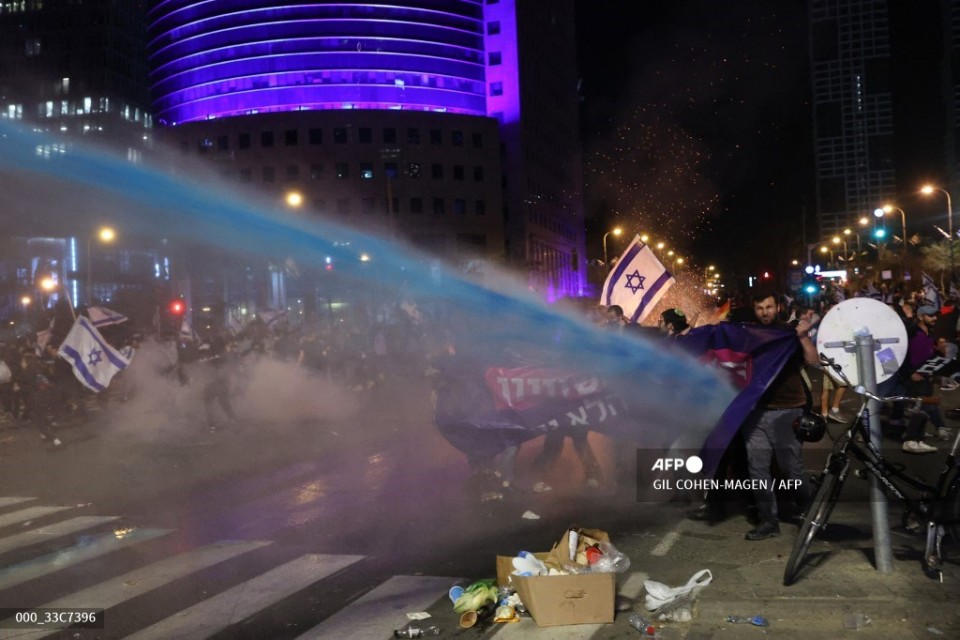
by Rosie Scammell
Israel’s Prime Minister Benjamin Netanyahu on Monday night paused a judicial overhaul which triggered a general strike, political division and mass protests in the country’s most severe domestic crisis in years.
After nearly three months of increasing tensions, Netanyahu said in a broadcast: “Out of a sense of national responsibility, out of a will to prevent a rupture among our people, I have decided to pause the second and third readings of the bill” to allow time for dialogue.
The proposed reforms would curtail the authority of the Supreme Court and give politicians greater powers over the selection of judges.
The legislation will now be considered further in the next session of parliament, which begins in the second half of April, the prime minister said.
His comments came a day after he sacked his defence minister, Yoav Gallant, who had called for a halt to the legislative process citing national security concerns.
Earlier Monday, President Isaac Herzog, who holds a largely ceremonial role, made a similar demand, and tens of thousands of protesters had rallied near parliament in Jerusalem after the strike declaration.
Flights had been disrupted, hospitals stopped non-emergency services, and even diplomats walked off the job.
But immediately after Netanyahu announced the pause, Arnon Bar-David, chairman of the Histadrut trade union confederation, called off the strike.
About 80,000 demonstrators joined the Jerusalem rally against the reform package, the latest such protest to draw tens of thousands, Israeli media estimated.
A nearby counter-demonstration attracted thousands of right-wing backers of the overhaul, an AFP journalist said, after Israel’s National Security Minister Itamar Ben-Gvir urged their attendance.
Demonstrators have for months decried the reform plans as a threat to Israel’s democracy.
– ‘Tangible threat’ –
The proposals have sparked concern from Israel’s allies, including the United States, and Washington welcomed Netanyahu’s pause “as an opportunity to create additional time and space for compromise”, Press Secretary Karine Jean-Pierre said.
Israeli opposition leader Yair Lapid said he is ready to engage in dialogue over the proposed changes “if the legislation truly and totally stops,” and the government is not bluffing.
One of the protest groups, the Umbrella Movement Against Dictatorship in Israel, feared a trick to weaken their movement. In a statement, they also sought a complete halt to the legislative process and said they would continue demonstrating if it isn’t stopped.
Former defence minister Benny Gantz, a leading opposition figure, said he was immediately ready for talks mediated by Herzog.
“Better late than never,” Gantz said of Netanyahu’s pause.
Herzog, who had previously raised the spectre of civil conflict, said: “Stopping the legislation is the right thing. This is the time to begin a sincere, serious, and responsible dialogue that will urgently calm the waters and lower the flames.”
Netanyahu, in his address, said that “we can’t allow a civil war.”
Yoav Gallant, the outgoing defence minister who had been a staunch ally of Netanyahu, on Saturday cited a “tangible threat to Israel’s security”.
Referring to threats by reserve military personnel not to report for duty, he said: “The growing social rift has made its way into the (army) and security agencies.”
Moments after Netanyahu fired Gallant on Sunday, demonstrators converged on a central highway in Tel Aviv, blocking traffic and burning tyres. Some threw metal barricades at mounted officers while police deployed water cannon.
– ‘Mad reform’ –
At the Jerusalem protest on Monday, Keren Mimran, a 57-year-old tech worker, told AFP, “We are calling on the government to stop this mad reform.”
Figures from Israel’s economically important hi-tech sector have played a key role in the protests and some analysts said uncertainties related to the reforms had already triggered economic decline.
Israeli media reported the extreme-right minister Ben-Gvir was threatening to quit if the overhaul was put on hold.
The government, a coalition between Netanyahu’s Likud party and extreme-right and ultra-Orthodox Jewish allies, argues the changes are needed to rebalance powers between lawmakers and the judiciary.
According to Lapid, the government “has undergone a hostile takeover by a messianic, nationalist and anti-democratic group”.
Lawmakers were scheduled to vote this week on a central part of the proposals, which would change the way judges are appointed. That has now been put off.
A parliamentary committee has already amended the draft law to make it more acceptable to opponents, but the opposition ruled out backing any part of the reform package until a pause in all legislative steps.
Netanyahu last week vowed to “responsibly advance” the reforms and “end the rift” they have caused.
In response, Attorney General Gali Baharav-Miara on Friday accused him of “illegal” public intervention on the process, citing potential conflict of interests due to his ongoing trial.
The premier is facing charges of bribery, fraud and breach of trust, which he denies.
© Agence France-Presse







